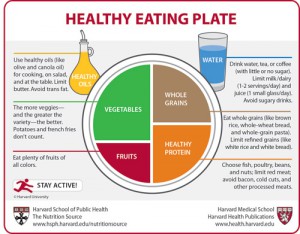Harvard One-Ups the USDA
Not too long ago, the USDA tossed out the Food Pyramid in favor of MyPlate – an infographic that represented the elements of a healthy diet arranged on a plate. While not perfect, it represented a step in the right direction, as it was the essence of simplicity.
However, the folks over at the Harvard Health Blog felt it could be improved on. Their version, the “Healthy Eating Plate,” not only gets the job done, but provides better guidance than the USDA’s version (click to embiggen):
Why bother modifying MyPlate? Because it offers little—or inaccurate—advice. It says nothing about the quality of carbohydrates (grains). White bread and white rice raises blood sugar in a flash—whole grains are better for long-term health. It makes no distinction between healthy sources of protein such as beans, fish, and poultry, and less healthy sources, such as red and processed meat.
In addition, MyPlate recommends milk or dairy at every meal, even though there is little evidence that high dairy intake protects against osteoporosis and substantial evidence that consuming a lot of milk and dairy foods can be harmful. It says nothing about healthy oils, which are good for the heart, arteries, and the rest of the body. And it is shockingly silent on sugary drinks, which provide far too many empty calories.
…The Healthy Eating Plate is based on nutritional science and is not influenced even a smidgeon by commercial pressure. We hope it will be a useful alternative that provides specific direction for anyone who needs help following a healthy diet.
There’s not much here to argue with! FWIW, I think the Harvard folks are a bit harsh on potatoes (IMHO, sweet potatoes/yams in particular could be included as grain alternatives) and they’re “shockingly silent” on eggs, but these are pretty minor quibbles.





September 18, 2011
I’m fine with Harvard’s version just as long as the dessert plate follows this dinner plate. 🙂
September 18, 2011
Of course it can… every once in a while. 😉
September 19, 2011
I think the Harvard version at least explains more of what they consider fits in each catagory. It does give more guidance than the USDA version.
I’m also wondering about their thinking about the potatoes and the eggs.